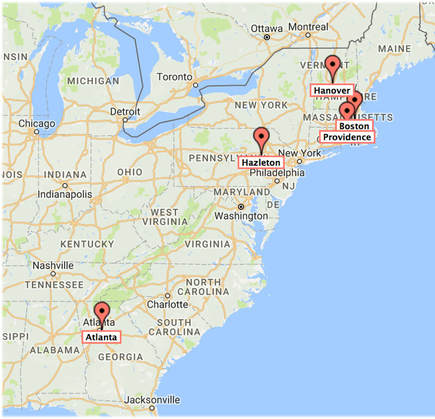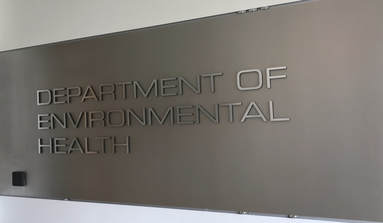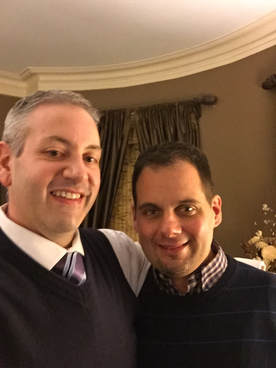|
My research, teaching, and service roles can be broadly characterized by a commitment to inter- and multi-disciplinary research and training, and scientifically to understanding the molecular mechanisms responsible for mediating the impact of the environment in human disease. The experiences I have had over the course of my career have shaped this commitment, and, I believe, have allowed me to contribute in a significant way to our understanding of environmental public health.
I received my Ph.D. in the Biological Sciences in Public Health at Harvard University. This program represents one of the first graduate programs in the country to train students in a multidisciplinary framework, exemplified by my core cross-training in molecular biology, genetics, epidemiology and biostatistics. After completing my Ph.D., in 2004, I undertook a postdoctoral fellowship at the Harvard School of Public Health, mentored by Dr. Karl Kelsey, a recognized international leader in environmental health and cancer molecular epidemiology. The core values of collaborative multi-disciplinary research instilled by my graduate and postdoctoral training have been influential on my career and have defined my philosophy on research, teaching, and mentorship. I accepted a position as Assistant Professor in Pathology and Laboratory Medicine at Brown University in 2007, and was recruited to the Geisel School of Medicine at Dartmouth in September 2011, where I was promoted to the rank of Associate Professor in Pharmacology and Toxicology and in Epidemiology in 2012. In early 2016, I was recruited as Professor to the Department of Environmental Health in the Emory University Rollins School of Public Health. |
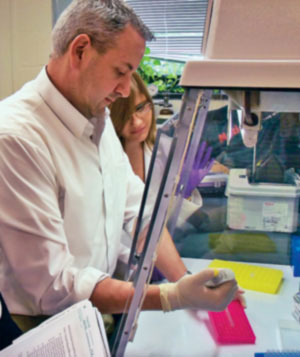
RESEARCH
My research has focused on two distinct, yet highly related biologic processes, that of environmental carcinogenesis and that of human development. In those settings, I am studying a variety of molecular alterations, with a growing interest on –omics technologies, which may be responsible, in a significant part, for cancer, adverse pregnancy outcomes, and common and rare conditions of childhood including obesity, growth, and behavioral disorders. In particular, I have developed a significant expertise in environmental epigenomics, incorporating studies of the impact of the environment on the mechanisms controlling the fundamental cellular process of gene expression control, and how alterations or variation to these features impact health and disease. This research program fits at the interface of basic and population sciences, providing a sound scientific basis to studying a mechanism underlying the environmental contribution to health outcomes.
I have had experience in the studies of environmental carcinogenesis with a particular focus on tobacco-related cancers, including lung cancer, head and neck cancers, and bladder cancer. We ask questions not only to address the link between an environmental factor and disease risk or prognosis, but how do exposures link to molecular alterations that contribute to risk. We have continued to develop novel DNA methylation based biomarkers in peripheral blood in order to improve risk stratification and understand prognosis.
My research has focused on two distinct, yet highly related biologic processes, that of environmental carcinogenesis and that of human development. In those settings, I am studying a variety of molecular alterations, with a growing interest on –omics technologies, which may be responsible, in a significant part, for cancer, adverse pregnancy outcomes, and common and rare conditions of childhood including obesity, growth, and behavioral disorders. In particular, I have developed a significant expertise in environmental epigenomics, incorporating studies of the impact of the environment on the mechanisms controlling the fundamental cellular process of gene expression control, and how alterations or variation to these features impact health and disease. This research program fits at the interface of basic and population sciences, providing a sound scientific basis to studying a mechanism underlying the environmental contribution to health outcomes.
I have had experience in the studies of environmental carcinogenesis with a particular focus on tobacco-related cancers, including lung cancer, head and neck cancers, and bladder cancer. We ask questions not only to address the link between an environmental factor and disease risk or prognosis, but how do exposures link to molecular alterations that contribute to risk. We have continued to develop novel DNA methylation based biomarkers in peripheral blood in order to improve risk stratification and understand prognosis.
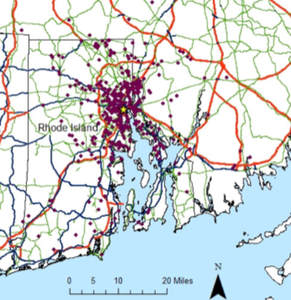
The core area of current research in my laboratory is focused on the paradigm of the developmental origins of health and disease (DOHaD), and particularly the importance of epigenetic regulation in this phenomenon. I established and successfully recruited a birth cohort, the Rhode Island Child Health Study (RICHS) with collaborators at Women and Infants Hospital in Providence, RI. Through RICHS and in collaboration with the Dartmouth Children's Environmental Health and Disease Prevention Research Center, my laboratory has contributed significantly to the growing and evolving field of behavioral epigenetics as well as on understanding the contribution of the prenatal environment to children's health, particularly through our studies of epigenetic mechanisms.
I have built a successful, internationally recognized research program focused on epigenetic mechanisms in human health, evidenced by leading independent and multi-PI NIH R01 grants, projects in multi-investigator program projects, a training grant to support Ph.D. students, and by serving as a co-investigator on a number of collaborative projects. I currently serve as a member of the Infection, Reproduction, Asthma and Pulmonary Conditions (IRAP) charted study section of the NIH/CSR, have participated in workshops considering epigenetics in risk assessment at the US EPA, serve as Chair of the External Advisory Committee for the University of Southern California Minority Environmental Health Disparties Research Center entitled Maternal and Developmental Risks from Environmental and Social Stressors (MADRES), and as an external advisor to the Columbia University Environmental Health Center. My program is based upon my unique training and experience combining molecular biology, genetics, and population-based research and has led to the establishment of a unique, successful, and impactful program of research, training, and mentorship, which I am excited to continue and expand in order to impact human health as well as train the next generation of scientists and scholars.
I have built a successful, internationally recognized research program focused on epigenetic mechanisms in human health, evidenced by leading independent and multi-PI NIH R01 grants, projects in multi-investigator program projects, a training grant to support Ph.D. students, and by serving as a co-investigator on a number of collaborative projects. I currently serve as a member of the Infection, Reproduction, Asthma and Pulmonary Conditions (IRAP) charted study section of the NIH/CSR, have participated in workshops considering epigenetics in risk assessment at the US EPA, serve as Chair of the External Advisory Committee for the University of Southern California Minority Environmental Health Disparties Research Center entitled Maternal and Developmental Risks from Environmental and Social Stressors (MADRES), and as an external advisor to the Columbia University Environmental Health Center. My program is based upon my unique training and experience combining molecular biology, genetics, and population-based research and has led to the establishment of a unique, successful, and impactful program of research, training, and mentorship, which I am excited to continue and expand in order to impact human health as well as train the next generation of scientists and scholars.

TEACHING
My teaching philosophy also incorporates my interdisciplinary approach to research, and has aimed at providing the students in my courses, a broad, interdisciplinary, and cutting edge education. More important, though, is my approach to mentoring and working with students in my research group to develop their research skills and prepare them for careers in scientific research, education, and application. Students in my laboratory experience a mentoring philosophy clearly focused on preparing them for interdisciplinary and cutting edge research and work in human biomedical science. Each of my students and trainees independently designs their research projects under the basic themes of my research. As my students work on population-based research and samples, they must receive extensive training in epidemiologic, biostatistical and bioinformatic approaches to data analysis, which are critical for this type of research. This is, of course, in addition to their fundamental training in molecular biology and genetics as well as laboratory skills in the analysis of human tissue samples and in vitro cell culture based techniques. My graduate students have gone on to successful careers following their training, including Research Fellowships at the International Agency for Research on Cancer (IARC), or positions in the US EPA and CDC. My postdoctoral fellows have found careers in academia, as well as in scientific writing and communication and industry.
My dedication to training has also been recognized through the successful application and awarding of a Burroughs Wellcome Training Grant Unifying the Population and Laboratory Sciences application at Dartmouth with my collaborator Scott Williams. I have also served as director of the Program in the Quantitative Biomedical Sciences at the Geisel School of Medicine at Dartmouth, and starting in 2018, I will serve as Director of the Environmental Health Sciences Graduate Program, here at Emory.
My teaching philosophy also incorporates my interdisciplinary approach to research, and has aimed at providing the students in my courses, a broad, interdisciplinary, and cutting edge education. More important, though, is my approach to mentoring and working with students in my research group to develop their research skills and prepare them for careers in scientific research, education, and application. Students in my laboratory experience a mentoring philosophy clearly focused on preparing them for interdisciplinary and cutting edge research and work in human biomedical science. Each of my students and trainees independently designs their research projects under the basic themes of my research. As my students work on population-based research and samples, they must receive extensive training in epidemiologic, biostatistical and bioinformatic approaches to data analysis, which are critical for this type of research. This is, of course, in addition to their fundamental training in molecular biology and genetics as well as laboratory skills in the analysis of human tissue samples and in vitro cell culture based techniques. My graduate students have gone on to successful careers following their training, including Research Fellowships at the International Agency for Research on Cancer (IARC), or positions in the US EPA and CDC. My postdoctoral fellows have found careers in academia, as well as in scientific writing and communication and industry.
My dedication to training has also been recognized through the successful application and awarding of a Burroughs Wellcome Training Grant Unifying the Population and Laboratory Sciences application at Dartmouth with my collaborator Scott Williams. I have also served as director of the Program in the Quantitative Biomedical Sciences at the Geisel School of Medicine at Dartmouth, and starting in 2018, I will serve as Director of the Environmental Health Sciences Graduate Program, here at Emory.
|
Outside of the lab, Carmen lives in the Atlanta area with his husband, Kevin Lucianno, and they are the fathers of two spoiled dogs, Brody, a schnoodle, and Koby, a wheaton terrier. Kevin is a kitchen designer, and Carmen enjoys spending his time in the kitchen cooking and experimenting with new recipes. They have enjoyed learning about and exploring their home in Atlanta, visiting the various neighborhoods, and taking part in festivals and events.
|
